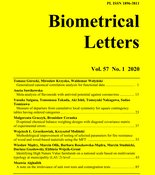
Biometrical Letters Vol. 57(1), 2020, pp. 1-12


There is a growing need to analyze data sets characterized by several sets of variables observed on the same set of individuals. Such complex data structures are known as multiblock (or multiple-set) data sets. Multiblock data sets are encountered in diverse fields including bioinformatics, chemometrics, food analysis, etc. Generalized Canonical Correlation Analysis (GCCA) is a very powerful method to study this kind of relationships between blocks. It can also be viewed as a method for the integration of information from K > 2 distinct sources (Takane and Oshima-Takane 2002). In this paper, GCCA is considered in the context of multivariate functional data. Such data are treated as realizations of multivariate random processes. GCCA is a technique that allows the joint analysis of several sets of data through dimensionality reduction. The central problem of GCCA is to construct a series of components aiming to maximize the association among the multiple variable sets. This method will be presented for multivariate functional data. Finally, a practical example will be discussed.

multivariate functional data, generalized canonical correlation analysis

